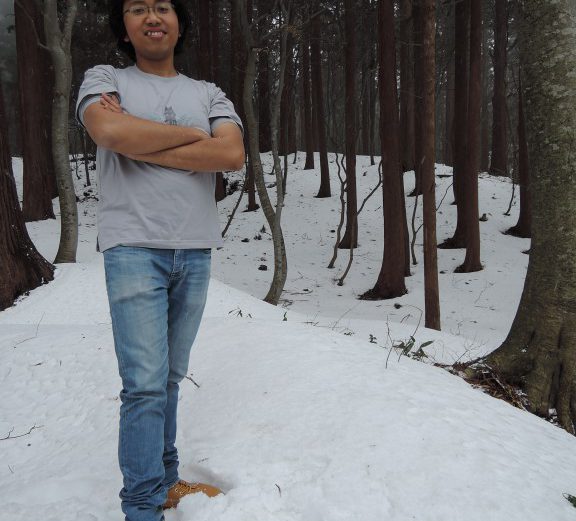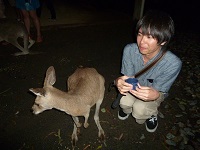Messages from Araki Lab Graduates (Daniel Pramudita) were updated. He is a graduate of IPADS Master course and an academic assistant at the Department of Chemical Engineering, Bandung Institute of Technology, Indonesia. As a recipient of the scholarship provided by Indonesia Endowment Fund for Education (LPDP, in Indonesian), he will go to the Ph.D. course in Otto Von Guericke University (OVGU) of Magdeburg, Germany, to work under supervision of Prof. Evangelos Tsotsas, who is an expert in field of drying.

Messages from Araki Lab Graduates (Daniel Pramudita) were updated.

Daniel’s update #1
Hi there! It has been 2 years since I graduated from the IPADS of The University of Tokyo. After leaving Araki’s Lab I returned to Bogor Agricultural University and helped my former supervisor, Prof. Armansyah, and friends do their researches. Well, it was more like I studied again than I really gave them. Some have now graduated from the bachelor and master programs, and some are still in the final year of Ph.D. I believe they are all doing well, especially since I know how capable Prof. Armansyah is. We had some hectic schedule at the end of the year, as we had to finish much paperwork required for research reports. I got a precious experience of how troublesome and tricky conducting research at a university in Indonesia could be. After spending about 6 months there, I got an offer from Department of Chemical Engineering, Bandung Institute of Technology, for a position of the so called “academic assistant”, which is a role of junior faculty member that is not yet given a status of full-time faculty member and It is much more like a structured trial and internship for a …

Xueting Ma
Master course student, 2nd grade Research Theme: Suchuan cuisine

Shunsuke Sasaki (Ph.D. course)
Research: Recycling by Scavengers Scavengers are people who earn their living by gathering recyclable materials from waste. These activities are considered informal, and typical examples are people who gather valuable resources on the street or in the final waste disposal site. We are researching on scavengers who live near a final waste disposal site in Indonesia. The current research theme is “Recycling by scavengers”, but we would like to perform more research on different aspects of the scavengers such as their lifestyle.

Airi Morita (Ph.D. course)
Research: Research on the Interrelation between Different Quality Attributes (Aromatic, Viscoelastic, and Sensory Characteristics) of Fermented Dairy Products All foods have particular characteristics such as aroma and texture, and we humans enjoy our eating procedure by “tasting” these multiple and diverse quality attributes comprehensively. For example, cheeses are fermented dairy products that possess complex aroma compositions and characteristic textures, and the disruption of the balance between these quality attributes leads to decrease of palatability. In this research, quality attributes of foods are measured both by measurement hardware and sensory evaluation. The objective of this study is to search for the optimum balance between multiple quality attributes by analyzing the interrelation between them. The ultimate goal is to develop a efficient system to produce preferable tasty foods.

Daniel (Master course)
Research: Study on Roasting Kinetics and Colour Change of Coffee Bean under Pre-roasting, Roasting, and Over-roasting Conditions Coffee is known as one of the most popular beverages in the world thanks to its unique flavour and aroma. The flavour and aroma of coffee beverages are developed through roasting. In fact, most roasting practices are based only on experiences. A common knowledge is a good cup of coffee needs an excellent touch of the hand of a coffee barista. Not many of coffee drinkers really understand how the beans are processed and why the processing is important. With enough knowledge of what is happening inside coffee beans during processing or coffee making, obviously one can improve how the coffee should be prepared and get the best coffee with desired flavour and aroma. Roasting can be divided into three stages, which are pre-roasting stage (including drying) at less than 150-160 ºC, roasting at more than 150-160 ºC, and over-roasting. So far studies on coffee roasting never cover those stages. In conducting a study on roasting a broader range of roasting condition is preferable not only for the elucidation of the process but …

Yukari Hirano (Master course)
Research: Development of a novel bread containing porridge made from high amylose rice Recently, owing to the rising price of wheat and excess supply of rice, bread made from wheat partially substituted with rice flour, is gathering attention. However, rice doesn’t contain gluten, a constituent in wheat which acts as the structure of the dough when it rises, and as a result, breads containing rice flour tend to expand less than those made from 100% wheat flour. Presently, there are products in the market containing rice flour, but from the reason described above, the substitution rate of wheat rarely exceeds 10% (except when gluten is added). Rice flour is attracting attention lately, as a new way of processing rice, an agricultural product that is very familiar to us. Rice flour is made from three steps: the harvested rice is polished, dried to facilitate the milling process, and milled. Compared to the rice we normally eat, it requires the two latter steps, which require time and money. Furthermore, once the rice is milled, the shelf life becomes much shorter than when it is kept as grains. In this research, we are …

Shingo Matsuyama (Master course)
Research: Development of noodles from high amylose rice using “direct gelatinization” High amylose rice has a higher content of amylose than the normal non-waxy rice consumed in Japan such as “Koshihikari”. It is of high-yield but has a lower eating quality when cooked, and is currently distributed as cheap feeding stuff for live stock. In this research, a method to gelatinize high amylose rice without milling the grain, “direct gelatinization”, is developed (the processing parameters are optimized). The final goal is to develop high amylose rice noodles using the direct gelatinization method.

Yoshinori Imamura (Master course)
Research: The goal of my study is to develop the technology to evaluate the functionality of the interior of agricultural products (ability to remove active oxygen) in a non-destructive and non-contact situations. It may become to be able to get information of inside of apples, by shed wide range of fluorescence light to outer skin of the apple, without touch and destruction. Fluorescence fingerprints(FF) is matrix of the three-dimensional data, “excitation wavelength irradiating the sample,” “the fluorescence wavelength emitted from the sample” of “fluorescence intensity of the sample”.By combining the conventional measurement methods and the FF technology to develop a new method for more rapid and convenient.

Shoji Sasao (Master course)
Research:Effect of enzyme activity, sugar composition and functional ingredients in banana influenced by high pressure processing High pressure processing of food is known to change enzyme activity and structure of protein. The main advantage of this method is that it does not destroy nutrients because there is no heat applied. In this study, changes in sugar compositions and maturing process of banana as a climacteric fruit undergoing high pressure processing is investigated. In the future, hopefully the method can be used to develop high nutrient processed banana.